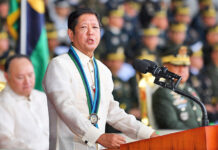
TOKYO (AFP) – Japan’s economy has gone into reverse, government data showed Wednesday, in a further blow to struggling Prime Minister Fumio Kishida.
The world’s number three economy shrank by 0.5 per cent between June and September compared to the second quarter, the preliminary data showed, worse than the consensus forecast of minus 0.1 per cent.
The drop, which followed two straight quarters of growth, was on the back of continued low consumer spending and weakness in the global economy hitting Japan’s exports.
Exports grew 0.5 per cent, down from 3.9 per cent in the previous quarter, while imports rose 1.0 per cent, further hitting overall growth.
Private demand, including private residential and corporate investment, fell 0.6 per cent.
The economy shrank 2.1 per cent compared to the same quarter last year, missing market expectations of minus 0.4 per cent, Bloomberg News reported.
Economists at Dutch bank ING however called the contraction “a fleeting aberration in an otherwise positive growth environment led by the service sector.”
Kishida’s poll ratings have hit their lowest levels since he took office two years ago, as consumers reel from rising prices.
The prime minister announced this month a stimulus package worth JPY17 trillion (USD113.2 billion) aimed at boosting the economy and easing the pain of inflation.
The government has already injected hundreds of billions of dollars into the economy over the past three years in response to the Covid-19 pandemic.
The latest plan involves income and residential tax reductions of JPY40,000 per person, and JPY70,000 cash handouts to low-income households.
Japan was for decades beset by deflation but, like other economies around the world, prices have risen since the Ukraine war began in February 2022.
A weaker yen, while welcome news to Japanese exporters, has made imports pricier and stoked inflation for households.
Unlike other major central banks, the Bank of Japan has kept interest rates below zero and bond yields ultra-low in a bid to boost economic growth.
That has come even as inflation persists, while the Bank of Japan’s stance has added to pressure on the yen, one of the worst-performing major currencies in 2023.
Germany – whose economy is also faltering – is set to leapfrog Japan as the world’s third-largest economy this year, partly because of the yen’s slide, according to projections from the International Monetary Fund.
Kishida, 66, can govern until 2025 but there has been speculation that he might call a snap election ahead of a likely tough internal leadership vote in his ruling Democratic Party (LDP) next year.
In September, Kishida reshuffled his cabinet and this week his deputy finance minister Kenji Kanda quit over a tax scandal, in the third recent resignation. Some LDP members have openly criticised the premier.



















































